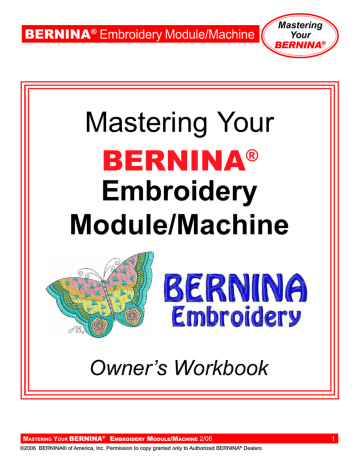advertisement

BERNINA
®
Embroidery Module/Machine
Mastering
Your
BERNINA
®
Thread
Poor quality or the wrong type of thread can cause poor stitches on any machine. Thread passes through the eye of the needle approximately 37 times in a “seesaw” action before it forms a single stitch. Poor quality thread results in crooked and looped stitches, uneven fills, misaligned outlines, frayed thread, and/or needle breakage. To achieve quality stitches, an embroidery machine needs five things: correct thread, correct stabilizer, correct hooping, correct needle, and properly adjusted thread tensions.
Several factors such as the fiber, twist, ply, finish, and size of thread must be considered for use with today’s fabrics for fine stitches.
Staple – refers to the length of fibers used to twist together to form a single ply. Domestic thread fiber lengths are usually 1½” to 2½” long while European threads use 5½” to 6½” lengths.
Ply – number of strands twisted together to make a single thread.
Roll – the tendency of thread to roll to the right or left during stitching, causing the stitch to appear slightly crooked. Poor quality threads are more likely to roll.
Twist – the crimping of fibers which causes them to interlock firmly into a single ply. Thread should not untwist during stitching. This will cause skipped stitches, thread breakage, crooked stitches, and weak spots in seams.
Right twist – most American threads are twisted to the right, causing some rolling. This gives average stitch quality.
Left twist – Most commercial and imported threads are twisted to the left, giving better than average stitch quality. Left twist resists rolling and makes a larger loop for the hook point to enter, reducing skipped stitches.
Notes
M
ASTERING
Y
OUR
BERNINA ® E
MBROIDERY
M
ODULE
/M
ACHINE
2/06
©2006 BERNINA® of America, Inc. Permission to copy granted only to Authorized BERNINA ® Dealers
16
advertisement
Related manuals
advertisement
Table of contents
- 3 Section A: Embroidery Beginnings
- 4 Introduction
- 5 General Information: Your Embroidery Machine/Module
- 9 v4.0 Embroidery Software
- 10 Getting Started
- 14 Needles
- 16 Thread
- 17 Embroidery Thread
- 18 Stabilizers & Interfacings
- 19 Sewing & Craft Sprays
- 20 Stitching A Motif
- 22 Monochrome Embroidery
- 24 Customizing Thread Color
- 26 Duplicating & Rescaling Motifs
- 28 Proportional Resizing of Motifs
- 30 Rotating Designs
- 32 Proportional Resizing & Rotation
- 34 Stretching Designs
- 36 Right-to-Left Mirror Image
- 38 Up-to-Down Mirror Image
- 40 Using Embroidery Cards
- 42 Using an Embroidery CD or USB stick
- 44 Saving & Deleting Embroidery Motifs
- 46 Embroidery Beginnings Shopping List
- 47 Section B: Beyond the Basics
- 48 General Information: Working with Alphabets & Text
- 49 Selecting, Adding, & Deleting Letters
- 50 Saving Text Designs
- 52 Alphabet Sampler
- 54 Manipulating Alphabets
- 56 Stitch Density
- 58 Combining Motifs
- 60 Combining Lettering & Motifs
- 62 Rehooping
- 64 Free-Arm Embroidery
- 66 Baseline Sampler
- 68 Changing Lettering Height
- 70 Changing Lettering Spacing
- 72 Mega Hoop
- 74 artista Portal
- 76 Beyond the Basics Shopping List